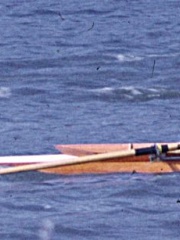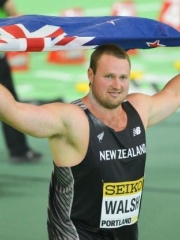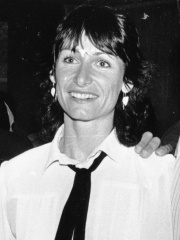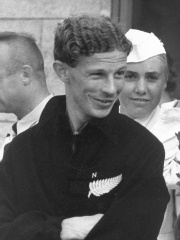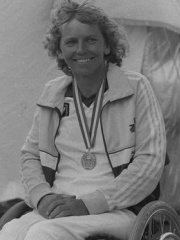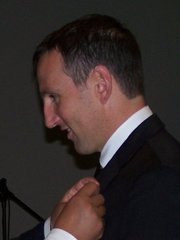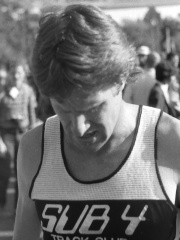

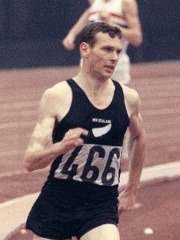


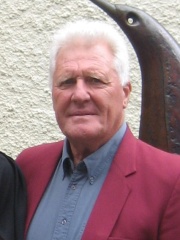
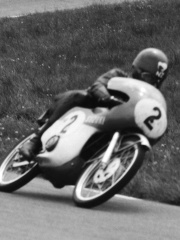
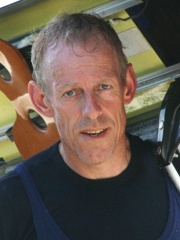
The Most Famous
ATHLETES from New Zealand
This page contains a list of the greatest New Zealander Athletes. The pantheon dataset contains 6,025 Athletes, 184 of which were born in New Zealand. This makes New Zealand the birth place of the 20th most number of Athletes behind Kenya, and Romania.
Top 10
The following people are considered by Pantheon to be the top 10 most legendary New Zealander Athletes of all time. This list of famous New Zealander Athletes is sorted by HPI (Historical Popularity Index), a metric that aggregates information on a biography's online popularity. Visit the rankings page to view the entire list of New Zealander Athletes.

1. John Walker (b. 1952)
With an HPI of 63.96, John Walker is the most famous New Zealander Athlete. His biography has been translated into 25 different languages on wikipedia.
Sir John George Walker, (born 12 January 1952) is a former middle-distance runner from New Zealand who won the gold medal in the men's 1500 m event at the 1976 Olympics. He was also the first person to run the mile in under 3:50. After his running career was over he was active in local government, as an Auckland Councillor and representing the Manurewa-Papakura ward.

2. Harry Kerr (1879 - 1951)
With an HPI of 59.10, Harry Kerr is the 2nd most famous New Zealander Athlete. His biography has been translated into 18 different languages.
Henry Edward Kerr (28 January 1879 – 17 May 1951) was a New Zealand athlete who competed mainly in walking events. He competed for Australasia in the 1908 Summer Olympics held in London in the 3500 metre walk where he won the bronze medal. This was the first time a New Zealand-born person had won an Olympic medal.

3. Peter Snell (1938 - 2019)
With an HPI of 58.33, Peter Snell is the 3rd most famous New Zealander Athlete. His biography has been translated into 35 different languages.
Sir Peter George Snell (17 December 1938 – 12 December 2019) was a New Zealand middle-distance runner. He won three Olympic gold medals, and is the only man since 1920 to have won the 800 and 1500 metres at the same Olympics, in 1964. Snell had a relatively short career as a world-famous international sportsman, 1960–1965, yet achieved so much that he was voted New Zealand's "Sports Champion of the (20th) Century" and was one of 24 inaugural members of the International Association of Athletics Federations Hall of Fame named in 2012. A protégé of the New Zealand athletics coach Arthur Lydiard, Snell is known for the three Olympic and two Commonwealth Games gold medals he won, and the several world records he set.

4. Warren Cole (1940 - 2019)
With an HPI of 56.50, Warren Cole is the 4th most famous New Zealander Athlete. His biography has been translated into 17 different languages.
Warren Joseph Cole (12 September 1940 – 17 July 2019) was a New Zealand rower who won an Olympic gold medal at the 1968 Summer Olympics in Mexico City.
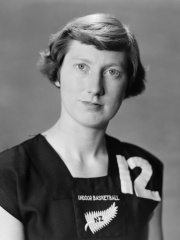
5. Yvette Williams (1929 - 2019)
With an HPI of 56.14, Yvette Williams is the 5th most famous New Zealander Athlete. Her biography has been translated into 28 different languages.
Dame Yvette Winifred Corlett (née Williams; 25 April 1929 – 13 April 2019) was a New Zealand track-and-field athlete who was the first woman from her country to win an Olympic gold medal and to hold the world record in the women's long jump. Williams was named "Athlete of the Century" on the 100th anniversary of Athletics New Zealand, in 1987.

6. Joe Earl (b. 1952)
With an HPI of 55.40, Joe Earl is the 6th most famous New Zealander Athlete. His biography has been translated into 18 different languages.
Athol John "Joe" Earl (born 1 October 1952) is a former New Zealand rower who won two Olympic medals. Earl was born in 1952 in Christchurch and grew up on a farm in Hawarden in North Canterbury. He received his education at St. Andrew's College, where he started rowing under Fred Strachan. As Strachan was one of the national rowing selectors, Earl was picked ahead of more experienced oarsmen (according to his own statement) for the New Zealand eight that was to contest the 1971 European Rowing Championships. The eight won gold, to the surprise of everybody, at the regatta in Copenhagen. At the 1972 Summer Olympics in Munich he teamed with Dick Joyce, Wybo Veldman, John Hunter, Lindsay Wilson, Tony Hurt, Trevor Coker and Gary Robertson and Simon Dickie (cox) to win the gold medal in the eights. He rowed with the men's eight in the 1975 World Rowing Championships in Nottingham, Great Britain, and won a bronze medal. At the 1976 Summer Olympics in Montreal he again crewed the eight which this time won the bronze medal. His crewmates this time were Alec McLean, Ivan Sutherland, Trevor Coker, Peter Dignan, Lindsay Wilson, Tony Hurt and Dave Rodger and Simon Dickie (cox). Earl's father died on his way to Munich. Whilst doctors had advised against travel due to a weak heart, his parents went nonetheless and his father died when they were in Italy. Earl still went ahead with the competition, and Strachan remarked later that "he still performed". The funeral had to wait until the rowers had returned to New Zealand. Joe Earl took over his father's farm until 1992. Afterwards, he was farming at Blackball on the West Coast. He then went into real estate and was at first branch manager in Rangiora. Since about 2009, he has sold real estate from Christchurch for PGG Wrightson.

7. Dudley Storey (1939 - 2017)
With an HPI of 53.44, Dudley Storey is the 7th most famous New Zealander Athlete. His biography has been translated into 19 different languages.
Dudley Leonard Storey (27 November 1939 – 6 March 2017) was a New Zealand rower who won two Olympic medals.

8. Hugh Anderson (b. 1936)
With an HPI of 53.44, Hugh Anderson is the 8th most famous New Zealander Athlete. His biography has been translated into 15 different languages.
Hugh Robertson Anderson (born 18 January 1936) is a four-time Grand Prix motorcycle road racing World Champion and a 19-time New Zealand national champion. He is also a two-time Isle of Man TT winner. In 2022, the F.I.M. inducted Anderson into the MotoGP Hall of Fame.

9. Eric Verdonk (1959 - 2020)
With an HPI of 53.36, Eric Verdonk is the 9th most famous New Zealander Athlete. His biography has been translated into 18 different languages.
Eric Franciscus Maria Verdonk (28 May 1959 – 3 April 2020) was a New Zealand rower who won bronze medals in the single sculls events at the 1988 Summer Olympics, 1986 Commonwealth Games, and 1990 World Rowing Championships.
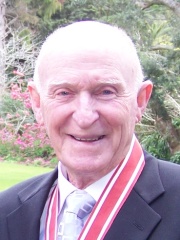
10. Murray Halberg (1933 - 2022)
With an HPI of 53.31, Murray Halberg is the 10th most famous New Zealander Athlete. His biography has been translated into 23 different languages.
Sir Murray Gordon Halberg (7 July 1933 – 30 November 2022) was a New Zealand middle-distance runner who won the gold medal in the 5000 metres event at the 1960 Olympics. He also won gold medals in the 3 miles events at the 1958 and 1962 Commonwealth Games. He worked for the welfare of children with disabilities since he founded the Halberg Trust in 1963.
People
Pantheon has 184 people classified as New Zealander athletes born between 1879 and 2002. Of these 184, 173 (94.02%) of them are still alive today. The most famous living New Zealander athletes include John Walker, Joe Earl, and Hugh Anderson. The most famous deceased New Zealander athletes include Harry Kerr, Peter Snell, and Warren Cole. As of April 2024, 18 new New Zealander athletes have been added to Pantheon including Paul MacDonald, Kevin Lawton, and Don Symon.
Living New Zealander Athletes
Go to all RankingsJohn Walker
1952 - Present
HPI: 63.96
Joe Earl
1952 - Present
HPI: 55.40
Hugh Anderson
1936 - Present
HPI: 53.44
Ross Collinge
1944 - Present
HPI: 53.03
John Hunter
1943 - Present
HPI: 52.68
Tony Hurt
1946 - Present
HPI: 51.17
Paul MacDonald
1960 - Present
HPI: 48.95
Grant Bramwell
1961 - Present
HPI: 47.88
Chris Harris
HPI: 47.73
Tom Walsh
1992 - Present
HPI: 47.38
Kim Min-jung
HPI: 46.64
Lorraine Moller
1955 - Present
HPI: 46.31
Deceased New Zealander Athletes
Go to all RankingsHarry Kerr
1879 - 1951
HPI: 59.10
Peter Snell
1938 - 2019
HPI: 58.33
Warren Cole
1940 - 2019
HPI: 56.50
Yvette Williams
1929 - 2019
HPI: 56.14
Dudley Storey
1939 - 2017
HPI: 53.44
Eric Verdonk
1959 - 2020
HPI: 53.36
Murray Halberg
1933 - 2022
HPI: 53.31
Jack Lovelock
1910 - 1949
HPI: 53.27
Neroli Fairhall
1944 - 2006
HPI: 51.90
Simon Dickie
1951 - 2017
HPI: 50.69
Trevor Coker
1949 - 1981
HPI: 49.62
Newly Added New Zealander Athletes (2025)
Go to all RankingsPaul MacDonald
1960 - Present
HPI: 48.95
Kevin Lawton
1960 - Present
HPI: 45.67
Don Symon
1960 - Present
HPI: 45.64
Keith Trask
1960 - Present
HPI: 45.27
Barrie Mabbott
1960 - Present
HPI: 45.02
Ross Tong
1961 - Present
HPI: 42.75
Brett Hollister
1966 - Present
HPI: 42.28
Shane O'Brien
1960 - Present
HPI: 41.77
Jenny Armstrong
1970 - Present
HPI: 40.81
Blyth Tait
1961 - Present
HPI: 39.54
Nathan Twaddle
1976 - Present
HPI: 37.47
Kate Hooper
1978 - Present
HPI: 35.49
Overlapping Lives
Which Athletes were alive at the same time? This visualization shows the lifespans of the 11 most globally memorable Athletes since 1700.

